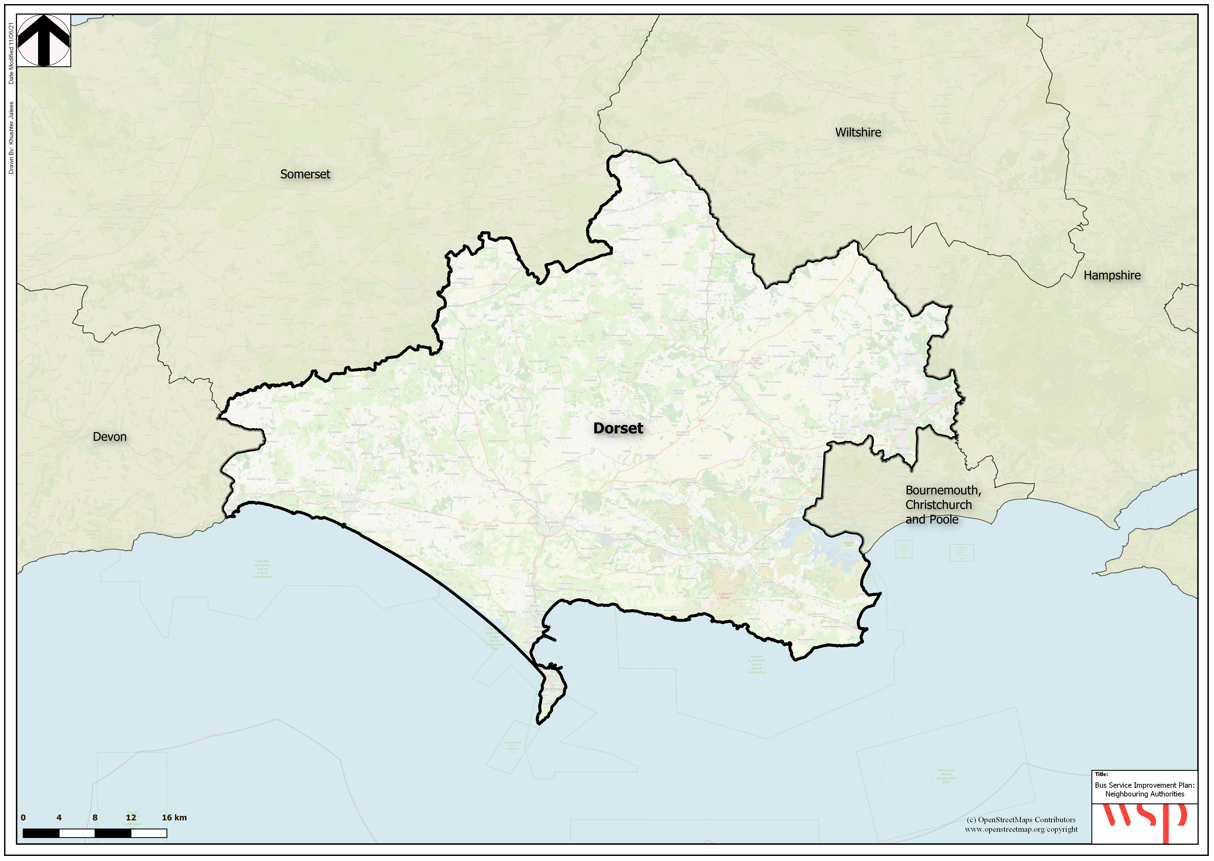Foreword
Dear Minister for Roads, Buses and Places,
It gives me great pleasure to present Dorset Council’s first Bus Service Improvement Plan and set out a new future for the bus network in the County.
This is the most significant change for bus services since deregulation in 1986. By working in close collaboration with operators and local groups we have developed an ambitious Bus Service Improvement Plan for Dorset that seeks to put the passenger first, raise the perception of bus travel, generate mode shift away from private cars, and see decarbonisation of the local transport fleet.
As the portfolio holder for highways, travel and environment I recognise the need for immediate action to reduce our carbon emission and respond to the climate and ecological emergency. The link between what we are doing on travel and climate change is of paramount importance to me. We have to give people viable alternatives to the car if we are to tackle the climate emergency.
My aim is to create a bus network that meets the needs of people of all ages and gives our residents opportunities to access work, education, training, health and leisure within Dorset. To get people to use the bus we must have a long-term plan and a guarantee of long-term Government funding for at least five years so we can change people's views and build their confidence to use the bus.
I view the Bus Service Improvement Plan as an opportunity to reset our bus network. We can make a real difference to people’s lives by improving accessibility across Dorset and reducing rural isolation. It’s also an opportunity to meet changing travel demands resulting in the dramatic shifts in the way people live and work seen as a result of the COVID-19 pandemic. The challenges facing us in Dorset are huge, but I have every confidence that our ambitious proposals will deliver a real transformation and see growth in bus travel.
This plan is just is the start. I'm greatly encouraged by the feedback from stakeholders. What they are telling me is that Dorset is being far more aggressive in its approach and pushing the boundaries of what we can achieve. Importantly they believe we have the right combination of proposals to make a difference.
These improvements are absolutely essential for Dorset. I live in a rural area and don't have a local bus service. I would love to be in a position to have a network of local feeder buses serving villages across Dorset and connecting to other buses and other forms of travel in local towns, so that we can provide the facility that meets the customer's needs, especially those that have no alternative to public transport.
Government funding is critical to enable us to deliver our ambitious proposals. Without it we don’t have the means locally to bring about the transformation local people are desperate to see.

Councillor Ray Bryan: Cabinet Portfolio Holder for Highways, Travel and Environment
Introduction
The government's National Bus Strategy – Bus Back Better sets out a vision to improve local bus services by making them:
- more attractive for passengers
- more affordable
- easier to understand and use
- faster and more reliable
- reduce bus fleet emissions
In response, we have developed a Bus Service Improvement Plan (BSIP) setting out our ambition to improve buses and the plans and policies that will deliver a transformation across the geographic area covered by this BSIP. The ambitious plan and deliverables set out are all subject to funding being identified.
Read the 2021 Bus Service Improvement Plan.
BSIP aims and objectives
The BSIP aims and objectives have been shaped by an extensive review of current public transport services in Dorset and a comprehensive programme of public and stakeholder engagement. Dorset’s BSIP aims and objectives are as follows:
- to significantly increase the number of people using local buses across Dorset by increasing local bus service frequencies, extending daily service times, adding additional services to better connect more isolated areas, increase bus reliability and user satisfaction, and meet new opportunities to capture sustainable travel demand
- to increase daily service availability with a mix of fixed and flexible services across rural and urban areas of Dorset, using new techniques in digital demand responsive transport linked to a more frequent core network to ensure that local buses and the wider public transport network is attractive, joined up and easy to use for everyone
- to develop a range of on-demand public transport services delivered by a mix of operators by identifying gaps in the current local bus network, understanding the population’s propensity to travel by different modes and develop a tool kit of options for on-demand transport that focus on improving journey times and access to the core network
- to continue to protect Dorset’s environment by moving to a decarbonised local bus fleet using a decarbonisation plan developed through this BSIP to ensure that we significantly reduce the environmental impact of local buses across Dorset using a progressive and partnership led roadmap with local bus operators
- to create and maintain a comprehensive network of travel options to link up communities and reduce rural isolation, delivered through a significantly expanded network focusing on core and feeder services with mobility hubs providing comfortable and safe interchange environments
Aspirations
The Dorset BSIP is an ambitious plan, focused on:
- revitalising the local bus network
- halting, and reversing the decline in local bus passenger use
- meeting the aspirations set out by the public and key stakeholders
- marking Dorset as a centre of excellence for rural transport provision
The proposals are grouped into 6 themes to reflect public and stakeholder local priorities, and the government’s aspirations in Bus Back Better.
| Theme | Aspiration |
|---|---|
| Better network coverage and scale | To develop, continually monitor and refine a network of buses that run more often, to more places and for longer daily periods. To deliver this policy a core network of services operating every 30-minutes between hub locations will be developed alongside a feeder service network with fixed and Digital DRT modes being tested and developed over time. |
| Better integration between modes | To develop and continually pursue opportunities to provide better integration between all public transport modes including timetable coordination, collective information, and ticketing. Dorset Council will work in partnership with all possible modes from walking and cycling for first and last mile trips to national long-distance networks to always integrate bus services. |
| Better and clearer information | To develop bus information that is consistent, accessible, simple, clear, and coordinated so that the public has a single source of truth and can confidently plan and undertake connected bus journeys across the local bus network and wider public transport system. Information will be maintained through multiple channels and will be a cornerstone of delivering Bus Back Better. |
| Better journey time reliability | To deliver targeted bus priority measures that ensure buses leave on time and remain on time while providing faster and more reliable services across the local bus network. Partnership work with local bus operators will identify opportunities alongside close working with planning colleagues to maximise funding opportunities through Section 106 schemes. |
| Better value and integrated fares | To ensure that simple value fares are targeted to attract and maintain mode shift. We will explore options for the roll-out of multi-operator, multi-mode ticketing using appropriate and cost-effective technology and processes. |
| Better vehicle standards and lower emissions | To deliver a zero-emission bus fleet by 2035 and ensure interim steps to green the existing local bus service fleet through options to renew older buses or upgrade their technology. Work closely with operators to create a Dorset standard configuration and better accommodate cycles on tourist focused services linked to better mobility and MaaS (Mobility as a Service) concepts. |
The council is seeking significant Government investment to deliver an ambitious and innovative plan. Without access to grant funding, Dorset Council would not be able to deliver these actions and innovate our local bus services.
Area Covered by the BSIP
This BSIP covers the whole area within the Dorset Council Unitary Authority boundary.
Whilst most local bus services outlined within the BSIP operate wholly within the Dorset Council area, a number operate into neighbouring LTA areas. As such we will work with colleagues in neighbouring areas to ensure there is alignment and overlap with the BSIPs being developed by:
- Devon County Council
- Somerset County Council
- Wiltshire Council
- Hampshire County Council
- Bournemouth, Poole and Christchurch Unitary Authority.
The Dorset Council BSIP Area

Alignment with wider council transport policy, strategy and plans
Bus service improvements support our Local Transport Plan policies and the Climate & Ecological Emergency Action Plan, helping to tackle the climate and ecological emergency as well as reducing traffic congestion and improving accessibility for residents and visitors.
Duration and Review of the BSIP
The BSIP is a living document and as such has no formal date limit.
The BSIP will be reviewed annually, and the council will publish 6 monthly progress summaries reporting against the following key performance indicator areas:
- journey times
- reliability
- passenger growth
- customer satisfaction
- mode share
- greening of the local bus fleet
- increases in network mileage
- proportion of the population within 400m of a frequent local bus service
- number of rail connections made by the local bus network
All BSIP reviews will be reported to the Place and Resources Scrutiny Committee and made publicly available. Updates will also be provided to Cabinet by the Lead Member for Environment, Travel and Harbours.
How you can help
Email your comments, suggestions and ideas to busbackbetter@dorsetcouncil.gov.uk or write to us at Transport Planning, County Hall, Colliton Park, Dorchester, DT1 1XJ.
Read the full 2021 Bus Service Improvement Plan and Appendices.
